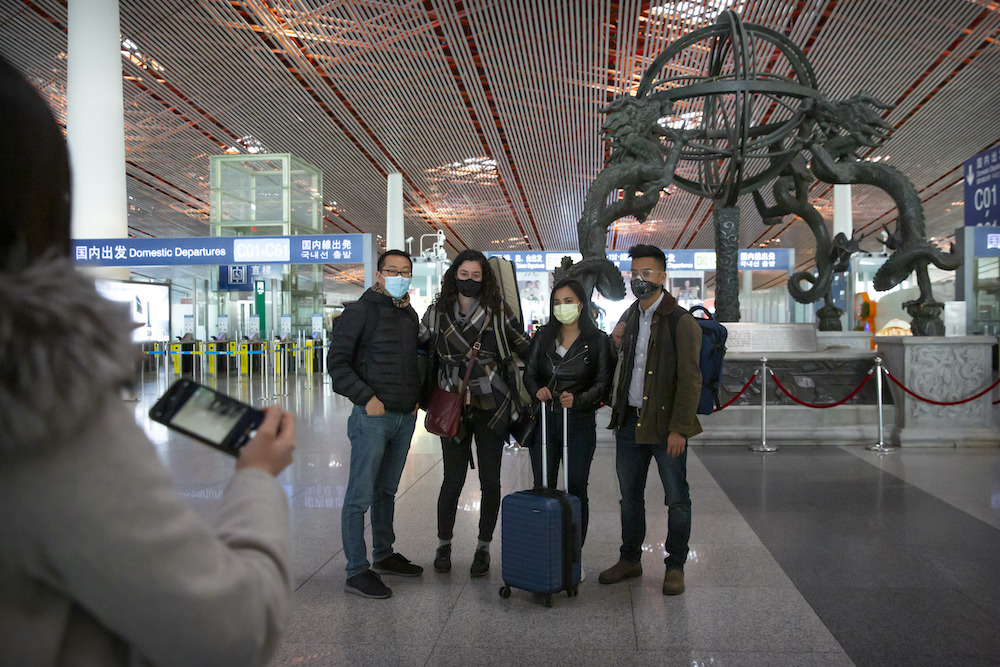After the World Health Organization declared that coronavirus was a global pandemic, news organizations became entangled in the increasingly hostile battle between China and the United States for global influence. In March, China announced it would expel more than a dozen American journalists in response to limits the Trump administration’s placed, weeks before, on visas for journalists from China’s five state news agencies. The retaliatory cycle escalated in September as the Chinese government refused to renew press credentials for foreign journalists working for U.S. news organizations in China.

What this battle means for coverage of China was a topic of discussion during a virtual talk in September at the Nieman Foundation. Moderated by New York Times diplomatic correspondent and former Beijing bureau chief Edward Wong, NF ’18, the discussion featured three journalists who have covered China from within its borders: Wenxin Fan, NF ’16, a Wall Street Journal reporter now based in Hong Kong; Anna Fifield, NF ’14, who recently finished a two-year stint as the Beijing bureau chief for The Washington Post; and Lucy Hornby, NF ’20, former deputy bureau chief in Beijing for the Financial Times.
The group discussed China’s response to the Covid-19 pandemic, the challenges of reporting on the country from within and afar, how foreign coverage of Xinjiang — the autonomous region where China has built nearly 400 internment camps holding Uighurs and other Muslim minorities — could influence the government’s actions, and more. Edited excerpts:
On how the challenges of reporting in China compare to North Korea
Anna Fifield: I had covered North Korea for a long time, for eight years. I wrote a book about Kim Jong‑un. When I arrived in China [as the new Beijing bureau chief in 2018], I was still finishing my book. I’m like, “OK, China is not North Korea. I have to stop myself from looking at everything through a North Korean lens.” China seemed to make it really difficult for this.
There were so many things that struck me as very similar in terms of the personality cult surrounding Xi Jinping that he’s created around himself, and the restrictions and increasing dangers in reporting. Then my very final trip, just three weeks ago [in early September], I went to Kashgar in Xinjiang province.
Everywhere I went, it felt like I was back in Pyongyang, partly because of the intense surveillance. The minders were waiting for us; we were tailed throughout. We were constantly called by the [government] minders to be reminded of the rules. At one stage, we counted eight cars actively following us.
The surveillance was really intense. It changes the way you report. I did not try as a reporter to have any conversations with people on the street, or in shops, or anything like that, because I knew that these heavies were following us and that there would be repercussions for people if they spoke to us even if it was just, “How’s your business going after Covid?” and things. It felt like any conversation would endanger them and invite unwanted scrutiny in the same way that it does in North Korea. In North Korea, I would have chitchat with people probably more than I did in Xinjiang while I was there.
Before I left, a source that I’ve known for quite some time said to me, “Everybody in China these days is saying, ‘We used to think that North Korea was our past but now we realize it’s our future.’” To hear this from him reinforced my own conclusions. That was my very sad parting shot to China. I don’t see any change happening anytime soon.
On reporting on China from Hong Kong
Wenxin Fan: Reporting in Hong Kong is still fine, but traveling back to mainland China is difficult for me as a Chinese citizen because of the risks it involves. Once you are caught reporting in China [for Hong Kong publications], even though you’re a Chinese citizen, then things can be problematic. It can go really wrong. I was about to go to Wuhan in January to cover Covid because I had some experience covering SARS. In this case, The Wall Street Journal was somewhat encouraging, but I had a cold, so I didn’t go.
Looking back, it’s lucky because two months later some of my colleagues were expelled from China and some of my colleagues who were in Wuhan were kept there until the end of the epidemic there. Some of my Chinese colleagues who went to Wuhan were from Beijing, so they went in their official capacity, and they were forced to retire.
I had gone back [to China] a couple times for stories that were relatively non‑sensitive. For some other stories, I would not go. I would give the story to a colleague based inside of China and do a partnership with them.
On how being a foreign correspondent in China has deteriorated
Lucy Hornby: It’s quite depressing. China, when I first got there in the mid-1990s, was basically a good news story. Things were getting palpably better for pretty much everybody, including for reporters. Foreign reporters that had been extremely limited in the ’80s, by the late ’90s could go anywhere, talk to anybody, basically do whatever they wanted.
That helped getting China’s stories out. But we saw a real change starting around 2008 when Beijing hosted the Olympics and there was an uprising by Tibetans. Since then, it’s gotten more and more squeezed. I don’t think it helps China, to be honest.
When we bring out normal citizens’ points of view, when we bring out their trials and tribulations, it helps the rest of the world to get a more nuanced understanding. By chasing foreign journalists out, you get an increasing influence within China of security services, or the military, or people who are leftists who think that Western influence is a bad thing.
On the flip side, we’ve done a lot to tell China’s positive story. Without us, if shrill pronouncements from the foreign ministry are going to be what dominates people’s perceptions of China, that’s not going to do China any favors either.
On the most important subjects to cover in China now
Hornby: One thing I would like to highlight is that the Beijing press corps is largely responsible for telling the rest of the world what’s been going on in Xinjiang. A lot of people I know were motivated by what they learned in school about the Holocaust and by a real desire that it not go in that direction. That’s been a tremendous influence on the rest of the world and, hopefully, on China’s behavior.
The other big thing, because I came from Reuters and the Financial Times, is that reporting on the Chinese economy is important — not just because of the way it influences the rest of us, but also because the Chinese economy can’t be only understood by their official statistics.
We journalists bring a lot to the table in terms of questioning when it’s all good news, giving more shape to it, and helping people outside understand how their countries intersect with China.
Fan: I would pick nationalism. It’s an old subject going back to the ’80s, but it’s different now. With Xi Jinping in power, China’s getting more assertive, and we’re seeing a very different approach in terms of public opinion forming, in terms of conquering foreign reports on Twitter, on Facebook, and especially on Weibo, Chinese social media.
They’re upgraded from Wumao, who are people paid to praise the government. Now, it’s a different group of people who are very aggressively attacking anyone who is critical of China, especially from within, especially against the Chinese citizens’ own criticism. It makes any dissent very difficult. It’s taking China on a trajectory on the world stage that is quite dangerous.
We’re seeing this on Twitter as an influence campaign when a lot of the China‑related accounts were taken out. Where it really plays out is on certain Twitter accounts, ones not everybody can see, which are always contradicting reports by foreign journalists, as well as on Weibo where people are very much attacked when they are critical. It makes everybody shut up, within China at least. It’s part of the reason why Covid was not caught in the first place.
Fifield: To echo what Lucy said about Xinjiang, everything the world knows about Xinjiang is because of the incredible reporting that The New York Times, The Wall Street Journal, The Globe and Mail did about what was happening there. BBC’s work has been amazing as well, going there, being on the ground, and showing the truth of China’s lies about what is happening there.
That has been the big story. That being said, a lot of the great reporting on that was also done outside the country from Kazakhstan, from Turkey, from people who’ve been able to escape and are then safe to do it. A lot of this reporting can be done from outside the country, which increasingly people are having to do because they’ve been expelled, or they can’t get in. …. [However, that’s] not the entirety of the Chinese story. It’s so important to have foreign correspondents on the ground telling the story of how ordinary people are thinking, that it is not monolithic in any way.
Since I went back this year after being shut out for a few months, I was trying to report about what Chinese people think about what has been happening in the world this year. It’s become so impossible to do any story. The one that sticks in my mind is that I wanted to write about international students who were Chinese students who were supposed to go to Harvard, or Princeton, or whatever.
Now, their parents didn’t want them to go there because it’s too dangerous to be in America with Covid. That’s very much in line with what Xinhua was reporting. I’d arranged a bunch of young students to talk to, with their parents’ permission. One by one, they all called back and canceled and said there were unspeakable reasons or they didn’t realize we were foreign media. It’s become really hard to talk to ordinary people.
The thing that I wanted to focus on is the role of propaganda in China today and the Chinese Communist Party’s control over the information and the narrative within China. A big thing that’s changed in the past few years is not just that the Chinese authorities have blocked more and more websites. There’s no Facebook, no Twitter, none of our publications are accessible inside China, no BBC. The BBC World can be broadcast but there’s no BBC website. People increasingly don’t have access to outside information. People increasingly do not use VPNs to access them. It’s become so finicky.
If you talk to university students, a lot of them don’t use VPN. Some of them do, but I’d say the vast majority no longer bother. They just exist within China’s parallel internet. The way that that is shaping young Chinese people’s thinking about their country and their country’s place in the world is very profound.
On the limitations — and the advantages — of relying on Chinese journalists for coverage
Fan: I think the answer [to whether we can rely on them to cover things inside China] is yes and no. Yes, because if you look at Covid coverage, for example, most of the stuff originally came out of Chinese media. We’re not just talking about a magazine called Caixin, which most people know, but a number of publications that did good stories.
Much of the coverage in the foreign press on Wuhan and Covid had some sources coming from the stuff we [in China] read. This is quite encouraging in a way because we always hear the journalism in China has died in the last few years. It suddenly came back alive again. That’s the promising side.
The unpromising side is there are limits. If you look at Xinjiang, which is a huge story, it wasn’t in the Chinese media at all. You can hardly rely on a translation of what you saw Chinese publication to know what’s happening there in Xinjiang.
For foreign publications, relying on Chinese nationals is still off‑limits. You’re not allowed to, as I said, work as correspondents. The exception is the wires, which are still there — Reuters, Bloomberg, AP — which hire quite a lot of Chinese nationals but cover mainly economic and business issues. But they do play a role when there are major stories. It’s just hard for everybody to see. There will be some of that support in those realms if they can be kept there inside of China.
On if the Western media will be forced out of China
Hornby: For historical perspective, there was only one time when it was impossible, totally, for Western media to report on China. That was during the Cultural Revolution [in the decade between 1966 and 1976], when the Reuters correspondent Anthony Grey, who was the only journalist there, got locked in his own basement for two years. That was obviously a very dark time for all sorts of reasons.
It’s going to be a long time before there are no foreign correspondents in China. By this, I include the really valuable work being done not just by Americans, but Japanese, Koreans, and Europeans.
I think it’ll be a long time because there’s still a desire and a need in China to attract attention, and especially financial attention, from the rest of the world. They recognize that that is not going to happen if they don’t have us there.
Though these foreign journalists are tolerated, [they’ll be] very circumscribed on what they’re reporting. I think that we’ve entered that period, and it could go on for quite some time.
On whether international coverage on Xinjiang will lead to China closing the internment camps
Fifield: There has been a lot of pressure from Western countries on China about this. China expects the United States, the U.K., Australia, New Zealand, etc. to condemn these kinds of things, so a lot of their efforts had been on trying to convince Muslim countries to write positive things about it, so they conducted a lot of press tours where they brought in journalists from Saudi Arabia, and Iran and other places in the Middle East to try to influence the coverage there.
The reporting on Xinjiang, the camps, by Western media did force China to admit that the camps existed, which they denied for a long time until the evidence just became incontrovertible. Of course, they said they were deradicalization, poverty alleviation efforts.
Now China is saying that the camps have been a great success, they’ve all closed, and people have been let back out to be full members of society again, but this is not true. There are all these actual prisons being set up to keep the population under control.
Shining a light on what they’re doing has had an influence, but it hasn’t stopped China from behaving in this way. I don’t think it will stop them.
As we’ve seen with what they’ve done in Hong Kong, the aggressive efforts there and what they’re doing inside the mainland, they know that there’s a cost for these kinds of actions, but they see benefits that seem to outweigh those costs so they continue regardless.
Hornby: I agree with Anna that there’s been a certain amount of international noise that may or may not have been as strong as we would have wanted it to be.
One thing, though, that reporting on things like this can do is give ammunition to people within the Chinese system that also don’t support their country going back to a Stalinist state.
We can report externally, but also every question we ask in a press conference, every time we stand up in front of the premier and ask about this, it goes into the record and it is seen by every single person at the top ranks of the Chinese hierarchy. That gives some of these people a chance to say, “What the heck is this?”
Whether they want to say it from the point of view of, “We’re going to lose investment dollars,” or whether they want to say it from the point of view of, “We don’t want to go back to being that kind of society,” whatever angle that they want to take, we can give them ammunition by making the noise externally. We shouldn’t underestimate our ability to do that, because at the end of the day, what’s going to change it is internal. Not whether or not some rights organization somewhere in Stockholm has something to say about it.
On what coverage Chinese citizens are interested in
Fan: Chinese citizens are very interested in the subject of surveillance. There is similar coverage inside of China on surveillance issues, not on Xinjiang but on cameras. The thing is that Chinese citizens want convenience more than anything. WeChat and other apps have made it very convenient for Chinese citizens. If your data is being lost to the world of WeChat, Alibaba, it’s fine because your life is so easy. That’s the issue.
I don’t think people necessarily want less foreign coverage. They do have distrust over China’s own coverage. The thing I worry about is people who read the coverage but have been trained to interpret it differently. It’s a little bit like the fake news debate. In the U.S., people are reading the same thing but come to totally different conclusions. That’s somewhat happening in China as well. As Anna said, in the old days it was Wumao and later on it was Little Pink. Those people, the propaganda side, focused on blocking stuff. The censorship is still there.
Some people want to be in control. Once they have control, have access to information, how do they interpret it? It’s going through a culture shock in reading a different kind of narrative. What do you do with it? That’s where nationalism plays a big role.



